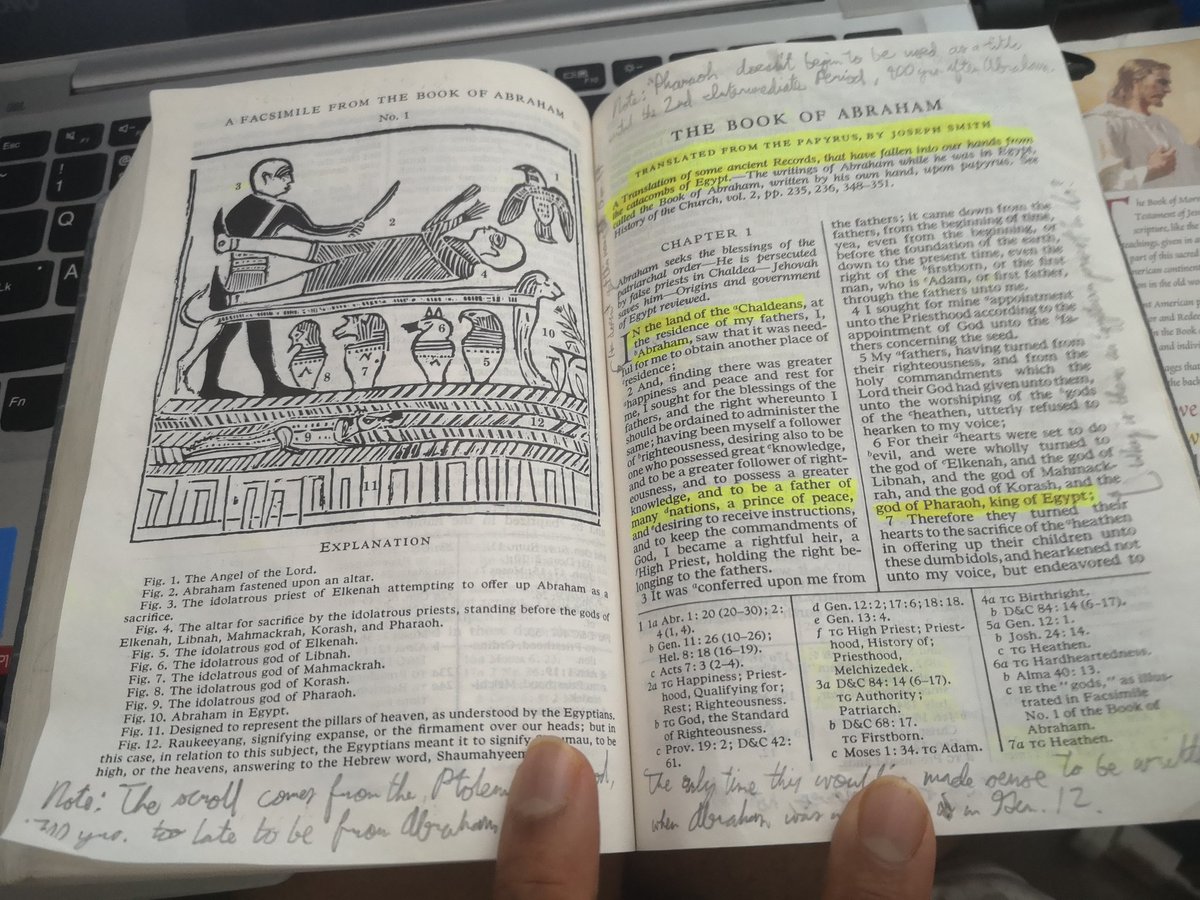Some observations that I made while reading the text of the Book of Abraham, wherein I make note of some historical and literary problems in the text (THREAD).
First of all, I will not primarily be going into the history behind the production of the Book of Abraham, as that is an entire issue all on its own. If you want the basic rundown, here are a series of talks by historian Dan Vogel on that. https://www.youtube.com/playlist?list=PLjxwXGB2KzRYNwypR4DqkZHnYVwRWNTc8
On the text itself, one can surmise that the events are probably set around the time Abraham was in Ur and in Egypt. This corresponds to Genesis 12, and in terms of date would likely be in the late 2000s/early 1900s BC. This will be important later on.
This leads us to the first problem: Abraham did not receive his name until Gen. 17:5. Before that he was called Abram. Why is he using a name that he would not receive from God until much later on? He also wouldn't have thought of himself as a "father of many nations" then (1:2).
The title "Pharaoh" is repeatedly used to refer to the king of Egypt, whereas that title wasn't used until the New Kingdom period, 400 years after Abraham. He also incorrectly translates it as "king by royal blood" (1:20), whereas the Egyptian term actually means "great house."
The text indicates that a priest of Pharaoh was in Ur (1:8ff), yet Ur was never under Egyptian influence. Also, when the priest dies, the text says "there was great mourning . . . in the court of Pharaoh" (1:20). There is no way news could travel that fast in the ancient world.
There is a hill in Ur called "Potiphar's Hill" (1:10, 1:20). This is an obvious anachronism, since Potiphar doesn't even show up until the time of Joseph (see Genesis 39).
The text says Egypt means "that which is forbidden" (1:23). Actually, the original Hebrew term Mizraim (מצרים) comes from the word "matzor" (מצור) which means "mound," or "fortress," according to the International Standard Bible Encyclopedia: https://www.biblestudytools.com/dictionary/mizraim/
The text then says a woman discovered Egypt while the land was under water (1:24). We have no historical record that indicates that Egypt was ever underwater (annual Nile floods notwithstanding), so I have no idea where this claim comes from.
The text then goes on to say "Now the first government of Egypt was established by Pharaoh" (1:25). Which pharaoh it was is not specified. We know from history that the first king of Egypt was Narmer, who ruled ca. 3050 BC, an certainly wasn't called "pharaoh."
The anecdote about Abraham being sacrificed in ch. 1 also resembles rabbinic legends about Abraham being thrown into a fire for denouncing the idolatry of the Chaldeans. It is possible that Joseph Smith knew of these stories from the Book of Jasher and from Josephus' Antiquities.
Evidence that Smith likely had access to these two texts is mentioned by Radio Free Mormon in the following episode of his podcast: https://radiofreemormon.org/2019/02/radio-free-mormon-055-the-book-of-abraham-missing-scrolls-catalyst-theories-and-bad-apologetics-part-3/
In 2:10, God says to Abraham "for as many as receive this Gospel shall be called after their name . . .". This makes no sense in context since Abraham would've had no reference point to figure out what the "Gospel" is. Besides, it comes from a Greek word, not Hebrew or Egyptian.
2:14 says Abraham was 62 years old when he departed out of Haran. This contradicts Genesis 12:4, which says he was 75 years old at the time.
In 3:1, Abraham is said to have possession of the Urim and Thummim. However, the Urim and Thummim aren't even produced until much later, in the time of Moses (see Exodus 28:30).
In 3:3, Abraham is told by God that the name of the great star is Kolob, "because it is near unto me." This wordplay makes no sense in either Hebrew or in Egyptian.
Now we get to astronomical errors. The moon is called a "planet" in 3:5. Another planet is said to exist above it (3:17), but what this refers to is not made clear.
The word "gnolaum" appears for eternal in 3:18. This appears to be an irregular spelling of the Hebrew word 'olam (עולם). But what is a Hebrew word doing in what is supposedly an Egyptian text?
3:27-28 seems to be the origin of the idea that Jesus and Lucifer vied to be the saviour of the world, and Lucifer rebelled against God when he didn't receive that role.
Chapter 4-5 is a polytheistic rewrite of Genesis 1-2. According to Dan Vogel, Joseph Smith learned that the Hebrew word "elohim" is plural in form, and he seems to have concluded from this that Genesis must therefore be teaching a plurality of gods.
Finally, 5:14-21 reverses the order of Genesis 2. In the book of Abraham, God first gives Adam a help meet, and then afterwards has him name the creatures. This completely ruins the narrative of Genesis, where the naming of the creatures sets the stage for the creation of woman.
So in conclusion, having looked at all the historical and literary evidence, I can safely say that I'm not convinced that the Book of Abraham is a divine work. The fact that it is included in the LDS Scriptures makes me severely doubt the authenticity of the whole corpus. #DezNat
BONUS: Here's a fun song about the book by the band Weird Alma, titled "Not Like Real Egyptian" (to the tune of "Walk Like An Egyptian") https://weirdalma.bandcamp.com/track/not-like-real-egyptian

 Read on Twitter
Read on Twitter